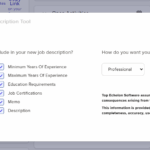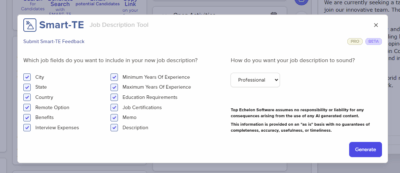In a previous blog post, we addressed the three factors that contribute most directly to a recruiter’s revenue. One of those factors is the quality of the job order.
The job order is a critical part of a search for any recruiter. A lot of things hinge on it. That’s why it has to be of a high quality. But there are other things related to the job order—and to the search in general—that a recruiter must know before accepting the job order and embarking upon the search.
Another of the three factors that contributes most directly to a recruiter’s revenue is the amount of urgency tied to the search. In other words, how urgently the hiring manager or other company official wants to fill the position. If there isn’t a lot of urgency tied to the search, it means the hiring manager probably won’t make it much of a priority.
Time to question (the hiring) authority
And . . . if the hiring manager does not make the search a priority, then who knows when they’ll finally “pull the trigger” and make an offer to a candidate. For all you know, they could drag the search out forever. (Okay, that’s an exaggeration . . . but only a slight one.) They could just keep asking for one more candidate. And another. And another. On and on until the end of time.
That’s why there is a question that every recruiter should ask the hiring manager when they accept a job order. That question is as follows:
“By what date do you want to have somebody on board?”
You’re asking that question for more than one reason. Actually, you’re asking it for more than one good reason. Those good reasons are as follows:
#1—To determine the urgency tied to the job order
If the hiring manager answers your question by blurting “ASAP,” that means there is NO urgency tied to the search. Oh, you may think there is. The hiring manager certainly wants you to think there is. But “ASAP” is nebulous. It’s subjective. There are no specifics. It gives the impression of having urgency without actually having urgency.
The hiring manager might not realize that they’re essentially sabotaging the search with such vague language . . . but sabotage is sabotage, my friends.
#2—To set a date from which you can work backwards
If you know the date that the hiring manager wants the position filled, you can arrange the schedule accordingly. The next most important date, of course, is when the hiring manager wants to schedule face-to-face interviews. And no, “ASAP” is not an acceptable answer! You need specific dates, not nebulous nonsense. (Although “Nebulous Nonsense” would be a great name for a band.)
#3—To set a date to which you can later hold the hiring manager accountable
This is handy if the process starts to drag out. You can say to the hiring manager, “Hey, I thought you wanted somebody on board by [insert date here]. What gives?” You can see how “ASAP” gives the hiring manager more “wiggle room” and allows them to hem and haw all the live-long day. You don’t want hemming and hawing. Instead, you want placing candidates and cashing placement checks.
As a recruiter, it’s not enough to ask questions. You have to ask the right questions. You have to ask the right questions of both your candidates and your clients. Asking the wrong questions and settling for the wrong answers—or at the very least, settling for vague, non-specific answers—can lead you down the road to ruin.
Eliminating headaches, heartaches, and heartburn
So the next time you accept a job order from a client (or a potential client), make sure to ask this very important question. You might just save yourself a big headache, a lot of heartache, and quite possibly heartburn.
Not to mention a ton of time.
Top Echelon offers a free monthly webinar as part of its Recruiter Coaching Series. After the webinars are over, we post the recorded version of the webinars on our website. These webinars touch upon a variety of recruiter-related topics. These topics deal with both candidates and clients. As always, our goal with these webinars (and corresponding videos) is to help recruiters make more placements.
Industry trainer Bob Marshall of TBMG International has a webinar video on the Top Echelon website that can help with the dilemma posed in this blog post. The title of that video is “The Opportunity Cost in NOT Shutting Down Job Orders.”
In addition to training and webinars, Top Echelon offers other recruitment solutions. These solutions include the following:
- Big Biller recruiting software
- Top Echelon split network
- Top Echelon contract placement services
For more information about Top Echelon and the products and services that it offers, visit the Top Echelon website by clicking HERE.








